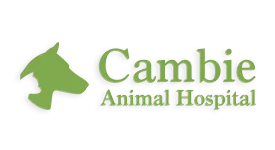Veterinarian in Vancouver Offers Nutritional Counseling For Your Pet

Ensuring pets eat food containing adequate amounts of protein is essential for supporting their health as kittens, cats, puppies, dogs and senior pets. Your pet's soft tissues, skin, eyes and nails depend on protein for growth and optimal functioning. Muscle meat (meat without bone) such as turkey breasts, chicken breasts and ground beef, provide vitamins B6 and B12 (for producing red blood cells and preventing anemia), phosphorous (bone growth), iron (cell metabolism), zinc (skin health) and niacin (for teeth and gum health). Your veterinarian in Vancouver, BC can help you develop dietary guidelines for your pet if you aren't sure what you should be feeding your pet at different life stages.
Puppy and Kitten Pet Nutrition
- Puppies - A puppy's diet should be composed of 30 percent protein, 20 percent essential fatty acids and 50 percent vitamins and minerals. Make sure to feed your puppy commercial puppy food stamped with the Association of American Feed Control Officials seal of approval. This means you are giving your puppy high-quality food meeting or exceeding nutritional standards for healthy development. Always have a fresh bowl of water available for your puppy.
- Kittens - A kitten's diet should also include plenty of protein, fatty acids and taurine, an amino acid cats can't produce using other amino acids. Necessary for reproductive, eye and heart functioning, taurine must be provided to cats in the form of a meat-rich diet. Also since cats cannot beta-carotene into vitamin A, they require taurine for making vitamin A, a nutrient vital to a cat's ability to see at night and for skin health. Your veterinarian in Vancouver, BC recommends feeding kittens specially formulated kitten chow and canned food until they are about one year old.
Feeding Your Adult Dog
Although dogs are mostly carnivores, they do have the ability to adapt to variable diets that include vegetables and grains. Canine diets should not be composed of 100 percent meat, since meat lacks calcium and iron, two minerals essential for your adult dog's general health. Give your dog a balanced mixture of wet and dry food. Dry dog food is packed with energy and offers dental benefits while wet food provides the fat and protein dogs need. Essential fatty acids are necessary for proper cell functioning, maintaining a shiny and healthy coat and reducing the risk of vision problems as dogs age.
Feeding Your Adult Cat
Cat nutrition differs from dog nutrition because cats are true carnivores, not omnivores like dogs. Cats also depend on what they eat to stay hydrated, which explains why cat owners complain they never see their cat drinking water. This is why cats should be given more canned food and less dry food than dogs. In addition, cat pet nutrition needs involve magnesium for supporting urinary tract health, fatty acids for optimal coat and skin health and manganese for processing proteins in the body.
Visit Our Local Veterinarian For More Pet Nutrition Information
For more information about the importance of pet nutrition, please schedule an appointment with your veterinarian in Vancouver, BC at (604) 321-6600.
